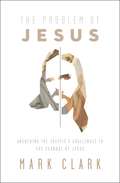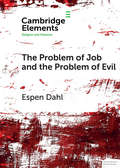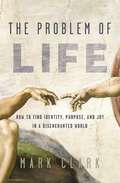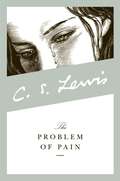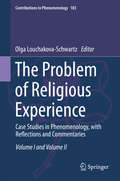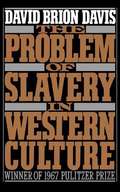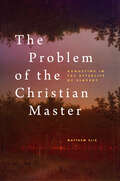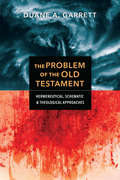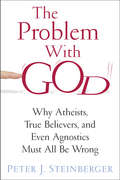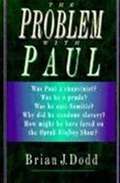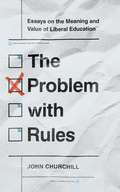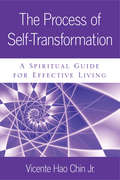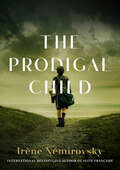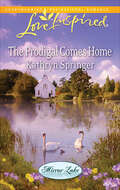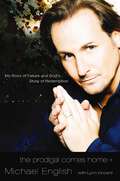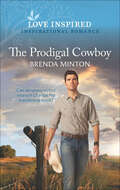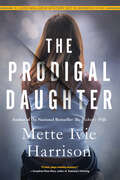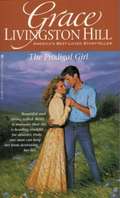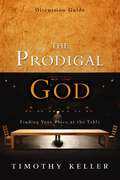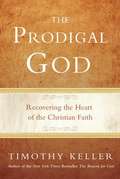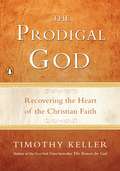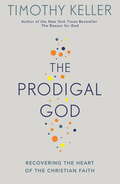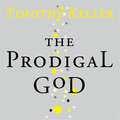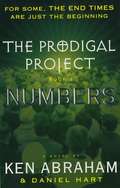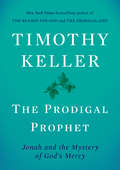- Table View
- List View
The Problem of Jesus: Answering a Skeptic’s Challenges to the Scandal of Jesus
by Mark ClarkThe modern world portrays Jesus in many ways for many reasons. Some are well-intentioned but misguided, others are aberrations, still others have some but not all the essential keys. In order to see and understand the real Jesus and what the Gospels say about him, we have to see him in his first-century context—and work out from there.Here is a portrait of Jesus that in some ways will affirm what traditional Christianity has always understood about him...and, in other ways, upend it altogether.Award-winning author Mark Clark delves into the person and work of Jesus of Nazareth: his parables and miracles, his controversial challenge of discipleship and obedience, his seemingly insane claim to be God, and what his death and resurrection (if they did happen) actually mean.Mark is unafraid to tackle questions such as:What would first-century Jews have immediately recognized about Jesus that modern Christians often miss?What do the Gospels accomplish, and can we trust them?Is there a problem with science and Jesus' miracles?What are the barriers stopping people from following him?And what is Christianity in light of an accurate portrayal of the object of its faith?The Problem of Jesus engages with ideas from all realms of study: from Malcolm Gladwell and Jordan Peterson to historians, scientists, and philosophers; from N.T. Wright to C.S. Lewis; from Star Wars to Pretty Woman—all unite to form a breathtaking and accurate portrait of Jesus, the man, the message, and the mission, who forever altered the course of human history. "As a former atheist, I would call this book philosophical dynamite...The Problem of Jesus will take your thinking about Jesus—and your relationship with him—to whole new levels." —Pastor and author, Ray Johnston.
The Problem of Job and the Problem of Evil (Elements in Religion and Violence)
by Espen DahlThis account of evil takes the Book of Job as its guide. The Book of Job considers physical pain, social bereavement, the origin of evil, theodicy, justice, divine violence, and reward. Such problems are explored by consulting ancient and modern accounts from the fields of theology and philosophy, broadly conceived. Some of the literature on evil - especially the philosophical literature - is inclined toward the abstract treatment of such problems. Bringing along the suffering Job will serve as a reminder of the concrete, lived experience in which the problem of evil has its roots.
The Problem of Life: How to Find Identity, Purpose, and Joy in a Disenchanted World
by Mark ClarkCompelling answers to your biggest questions about life.The Western world faces unprecedented levels of depression, anxiety, and loneliness. Despite advancements in wealth, knowledge, and longevity of life, many feel their lives lack significance, leading to a deep longing for fulfillment and happiness. In The Problem of Life, author Mark Clark recounts a pivotal moment when he mistakenly informed a woman of her husband's death. This profound mistake taught him invaluable lessons about existence and purpose. He argues that our relentless pursuit of money, family, and friendships--while important--often distract us from what truly matters, leaving us disenchanted.What if we could address this inner ache? What if we could discover our true place in the world?In this final book of a trilogy which began with The Problem of God, Clark presents 11 practical principles to help us flourish. He explores foundational topics like our origins, identity, and the meaning of suffering while drawing from biblical theology, psychology, and engaging stories, like:His battle with Tourette Syndrome and how it made him a better preacher and person.How he accidentally saved a woman from killing herself.Why scientists and tennis players agree that the cultural conversation about gender is all backward.Why your view on Sea World may predict your level of anxiety.What the dramatic events surrounding a false missile alert in Hawaii in 2018 have to do with you. The Problem of Life illustrates how we may be looking in all the wrong places for joy, contentment, and satisfaction and points us toward God as the remedy for our brokenness.
The Problem of Pain (C. S. Lewis Signature Classic Ser.)
by C. S. LewisIn The Problem of Pain, C.S. Lewis, one of the most renowned Christian authors and thinkers, examines a universally applicable question within the human condition: "If God is good and all-powerful, why does he allow his creatures to suffer pain?" With his signature wealth of compassion and insight, C.S. Lewis offers answers to these crucial questions and shares his hope and wisdom to help heal a world hungering for a true understanding of human nature.
The Problem of Religious Experience: Case Studies in Phenomenology, with Reflections and Commentaries (Contributions to Phenomenology #103)
by Olga Louchakova-SchwartzFor a long time, the philosophically difficult topic of religious experience has been on the sidelines of phenomenological research (with a notable exception of Anthony Steinbock, who focused on mysticism). The book The Problem of Religious Experience: Case Studies in Phenomenology, with Reflections and Commentaries brings together preeminent as well as emerging voices in the field, with fresh views on the topic. Originating from dialogues of the Society for the Phenomenology of Religious Experience, these two volumes cover a spectrum of phenomenological approaches, with a thematization of the field in the form of case studies. Contributions from theology, comparative religion, psychology and the philosophy of religion come together in the commentaries and meta-narrative written by Olga Louchakova-Schwartz (the editor). Volume I, The Primeval Showing of Religious Experience, examines religious experience with regard to its lived “interiority”, in light of the problem of the ego cogito, including the recent research on the embodiment of subjectivity and phenomenological materiality. Volume I also sheds light on religious experience in regard for the problems of its constitution, passive synthesis, the world, and otherness. Volume II, Doxastic Perspectives in the Phenomenology of Religious Experience, addresses the phenomenology of revelation, shows how different approaches treat the question of essence in religious experience (i.e., what is it that makes religious experience religious?), and demonstrates how religious experience contributes to the psychological horizon of meaning. The book identifies the “growing edges” in the phenomenological research of religious experience and is useful for psychologists, philosophers, and theologians alike. "The two volumes offer an excellent interdisciplinary introduction to the phenomenon of religious experience. The case studies presented in them are arranged under the central topics of self, alterity, revelation, and psychological aspects of religious experience and provide outstanding examples of applied phenomenology." Hans Rainer Sepp, Charles University, Prague, and Central European Institute of Philosophy "In the context of the "return of religion," this book offers both a timely and necessary contribution to confront the peculiarities of religious experience. Providing readers with applied phenomenological descriptions in an interdisciplinary spirit, these debates will prove stimulating for a resurgent field of research that is starting to refine its conceptual devices and methodological presuppositions." University of Vienna.
The Problem of Slavery in Western Culture
by David Brion DavisThe contradiction of slavery grew more profound when it became closely linked with American colonization, which had as its basic foundation the desire and opportunity to create amore perfect society. Davis provides a comparative analysis of slave systems in the Old World, a discussion of the early attitudes towards American slavery, and a detailed exploration of the early protests against Negro bondage, as well as the religious, literary, and philosophical developments that contributed to both sides in the controversies of the late eighteenth century.
The Problem of the Christian Master: Augustine in the Afterlife of Slavery
by Matthew EliaA bold rereading of Augustinian thought for a world still haunted by slavery Over the last two decades, scholars have made a striking return to the resources of the Augustinian tradition to theorize citizenship, virtue, and the place of religion in public life. However, these scholars have not sufficiently attended to Augustine&’s embrace of the position of the Christian slaveholder. To confront a racialized world, the modern Augustinian tradition of political thought must reckon with its own entanglements with the afterlife of the white Christian master. Drawing Augustine&’s politics and the resources of modern Black thought into extended dialogue, Matthew Elia develops a critical analysis of the enduring problem of the Christian master, even as he presses toward an alternative interpretation of key concepts of ethical life—agency, virtue, temporality—against and beyond the framework of mastery. Amid democratic crises and racial injustice on multiple fronts, the book breathes fresh life into conversations on religion and the public square by showing how ancient and contemporary sources at once clash and converge in surprising ways. It imaginatively carves a path forward for the enduring humanities inquiry into the nature of our common life and the perennial problem of social and political domination.
The Problem of the Old Testament: Hermeneutical, Schematic, and Theological Approaches
by Duane A. GarrettFor Christians, the Old Testament often presents a conundrum. We revere it as God's Word, but we don't always comprehend it. It has great truths beautifully expressed, but it also has lengthy lists of names that we cannot pronounce, detailed rules for religious rites that we never observe, and grim stories that we never tell our children. Theologians and laypeople throughout church history have struggled to define it, interpret it, and reconcile it with the New Testament. In The Problem of the Old Testament, Duane A. Garrett takes on this conundrum and lays a foundation for constructive study of the Old Testament. He surveys three primary methods Christians have used to handle the Old Testament, from the church fathers to today: hermeneutical, schematic, and conceptual. Garrett also explores major interpretive topics such as the nature of the law, the function of election and covenants, and how prophecy works, boldly offering a way forward that is faithful to the text and to the Christian faith. "I argue," Garrett writes, "that the Old Testament is fulfilled in Jesus Christ and that it is authoritative and edifying for Christians." This thorough, accessible work is essential reading for all students of Scripture seeking to discover the Old Testament's riches beyond the challenges.
The Problem with God: Why Atheists, True Believers, and Even Agnostics Must All Be Wrong
by Peter SteinbergerWhether people praise, worship, criticize, or reject God, they all presuppose at least a rough notion of what it means to talk about God. Turning the certainty of this assumption on its head, a respected educator and humanist shows that when we talk about God, we are in fact talking about nothing at all—there is literally no such idea—and so all of the arguments we hear from atheists, true believers, and agnostics are and will always be empty and self-defeating.Peter J. Steinberger's commonsense account is by no means disheartening or upsetting, leaving readers without anything meaningful to hold on to. To the contrary, he demonstrates how impossible it is for the common world of ordinary experience to be all there is. With patience, clarity, and good humor, Steinberger helps readers think critically and constructively about various presuppositions and modes of being in the world. By coming to grips with our own deep-seated beliefs, we can understand how traditional ways asserting, denying, or even just wondering about God's existence prevent us from seeing the truth—which, it turns out, is far more interesting and encouraging than anyone would have thought.
The Problem with Paul
by Brian J. DoddWas Paul a chauvinist? Was he a prude? Was he anti-Semitic? Why did Paul condone slavery? How might he have fared on the Oprah Winfrey Show? People outside the church have often found Paul hard to stomach. His views on women, sex and marriage, his failure to attack the institution of slavery, and his verbal attacks on his opponents have all come under fire. Regrettably, Paul hasn't always fared that much better among believers. Like the apostle Peter, many wonder what to make of Paul and his confusing, controversial--and sometimes apparently contradictory--teachings. To put it simply, Paul just isn't politically correct. Brian Dodd offers a fresh look at the perpetually enigmatic and misunderstood Paul. Combining pastoral insight and scholarly rigor, he helps us bridge the gap between Paul's ancient world and our postmodern setting. Here is much-needed perspective for making sense of Paul--the man and his message.
The Problem with Rules: Essays on the Meaning and Value of Liberal Education (The Malcolm Lester Phi Beta Kappa Lectures on Liberal Arts and Public Life)
by John ChurchillThere is a constant drumbeat of commentary claiming that STEM subjects—science, technology, engineering, and math—are far more valuable in today’s economy than traditional liberal arts courses such as philosophy or history. Many even claim that the liberal arts are "under siege" by neoliberal politicians and cost-conscious university administrators. In a forceful response, The Problem with Rules establishes the essential value of the liberal arts as the pedagogical pathway to critical thinking and moral character and argues for more not less emphasis in higher education. John Churchill asserts that the liberal arts are more than decorative frills. Drawing from the philosophy of Wittgenstein to craft a cogent, inspired argument, Churchill insists on the liberal arts’ indispensable role, providing in this book a clarion call to politicians, university administrators, and all Americans to recognize and actively support and nurture the liberal arts.
The Process of Self-Transformation
by Vicente Hao Chin Jr."From time immemorial," says the author, "sages from diverse cultures have passed on enduring solutions to the dilemmas of living. Yet their insights are not as known to the world as they ought to be." This deep, wise, and practical guide intends to make them more so.It is the harvest of the popular seminars developed and led by Vic Hao Chin, former president of the Theosophical Society in the Philippines and a worldwide teacher and presenter. He gives time-proven approaches for eliminating fear, resentment, worry, depression, and the stress of daily living in order to deepen spiritual practice.And he includes sections on overcoming negative conditioning, developing relationships, and optimizing physical health. To help readers in the process of self-actualization, he also provides helpful illustrations, case studies, and step-by-step instructions for meditation and breathing exercises.
The Prodigal Child
by Irène NémirovskyA story of hope and inspiration that becomes torn in the hands of the cold and greedy, and of betrayal by the powerful over lesser ones. Set in what was then contemporary Russia at the turn of the century, in a large port town on the Black Sea, The Prodigal Child is a story of a boy with a gift for composing poetry and songs—his inspiration drawn from within—who attracts the attention of a Princess. This wealthy and sophisticated woman rescues Baruch from his hard life, though it is one he also adores as a Jewish boy coming of age in his Orthodox Jewish community. But his freedom turns into a prison for him as he hopelessly falls in love with the Princess, who has no interest in the boy other than for the entertainment he provides her with his art. Falling deeper and yet with no rescue this time, he becomes ill and in his throes loses his gift, the very reason he had met the Princess in the first place. Of no use to her any longer, he is returned to his family to suffer tragic consequences.
The Prodigal Comes Home (Mirror Lake #3)
by Kathryn SpringerAfter ten years away, former "wild child" Zoey Decker returns to Mirror Lake to care for her ill grandmother. It seems no one will let her forget her teenage rebellion-and the tragic consequences. Except Matthew Wilde, the church's handsome new pastor. Matthew sees the kind, caring Christian Zoey has become. But spending time with her could hurt Matthew's reputation in the close-knit community. And her name will never appear on the town matchmakers' list of possible wives for him. But Matthew has his own list, with only one name-Zoey.
The Prodigal Comes Home: My Story of Failure and God's Story of Redemption
by Michael EnglishA painfully honest story of human weakness and God's unending forgiveness.Thirteen years ago, amidst scandal, sin, and shattered lives, Michael English fell from the pinnacle of the Christian music world. In 1994, newspapers around the world blared the headline, "Gospel Singer Named Artist of the Year Turns in His Awards After Confirming He Had an Affair with a Fellow Married Singer." From 1994 to 2002 Michael English's life went from bad to worse. Public shame, divorce, broken relationships, drug addiction, even homelessness. But in 2002, God reached out and rescued Michael from himself. Today Michael is whole again, and in this book he tells his story of redemption.
The Prodigal Cowboy: Mercy Ranch (Mercy Ranch #6)
by Brenda MintonA cowboy gets one last chance to make things right and reunite the family he once lost in this inspirational romance.Bull fighter Colt West gave up everything for the rodeo—including his sweetheart, Holly Carter. Now he’s come home to Hope, Oklahoma, with unexpected news: he and Holly are the guardians of the daughter they gave up for adoption eleven years ago. It’s a chance to be a family. But can Holly trust that her cowboy is finally here to stay?
The Prodigal Daughter (A Linda Wallheim Mystery #5)
by Mette Ivie HarrisonIn the wake of the #MeToo movement, has it become easier to speak out about sexual assault in religious communities?Linda Wallheim, increasingly disillusioned with her religion, has begun marriage counseling with her husband, Kurt, a bishop in the Mormon Church. On other days, Linda occupies herself with happier things, like visiting her five grown sons and their families. When Linda&’s eldest son, Joseph, tells her his infant daughter&’s babysitter, a local teenager named Sabrina Jensen, has vanished, Linda can&’t help but ask questions. Her casual inquiries form the portrait of a girl under extreme pressure from her parents to be the perfect Mormon daughter, and it eventually emerges that Sabrina is the victim of a terrible crime at the hands of her own classmates—including the high school&’s golden boys and future church leaders. Linda&’s search for Sabrina will lead her to the darker streets of Utah and cause her to question whether the Mormon community&’s most privileged and powerful will be called to task for past sins.
The Prodigal Girl (Grace Livingston Hill Ser. #56)
by Grace Livingston HillBetty Thornton knew what she wanted, and it wasn’t her father’s boring life-style. So when Betty’s father insists on moving the family to a farm in Vermont, she turns to dashing Dudley Weston--and his promises of excitement and marriage--as the answer to her problems. Then, through a terrifying chain of events, Betty finds herself abandoned in a snowstorm! Now her only hope for survival is a stranger... but can she trust him? There are over 50 more books by Grace Livingston Hill in Bookshare's library with more on the way. Among them are: #1 Where Two Ways Met, #2 Bright Arrows, #3 A Girl to Come Home to, #5 Kerry, #6 All Through The Night, #13 In Tune with Wedding Bells, #14 Stranger Within the Gates, #15 Marigold, #17 Maris, #18 Brentwood, #19 Daphne Deane, #22 Rose Galbraith, #24 By way of the Silverthorns, #26 The Seventh Hour, #30. Matched Pearls, #26 The Seventh Hour, #30 Matched Pearls, #33 Happiness Hill, #36 Patricia, #38 Spice Box, #41 blue ruin, #42 A New Name, #47 The Street of the City, #50 The Finding of Jasper Holt, #55 Ladybird, #60 Miranda, #61 Mystery Flowers, #66 The Girl From Montana, #68 The Story of a Whim, #70 in the way, #71 exit Betty, #72 The White Lady, #73 Not Under the Law, #74 Lo Michael, #76 The City of Fire, #77 The Ransom, #84 Cloudy Jewel, #93 Katharine’s yesterday, #95 Mary Arden and #96 because of Stephen.
The Prodigal God Discussion Guide: Finding Your Place at the Table
by Timothy KellerTwo sons, one who kept the rules religiously and one who broke them all. One Father who loved both lost sons beyond anything they could imagine. Discover how deep and far God's grace goes in The Prodigal God The Prodigal God discussion guide will help you uncover, personalize, and apply life-changing insights from The Prodigal God DVD and book. In six captivating sessions, pastor and New York Times bestselling author Timothy Keller opens your eyes to the powerful message of Jesus' best-known—and least understood—parable. The Prodigal God is a revelation of the very heart of the gospel: God's radical love for sinners of every kind. Taking you beyond the traditional focus on the wayward younger son, Keller helps you glean insights from each of the characters in Jesus' parable: the irreligious younger son, the moralistic elder son, and the Father who lavishes his love on both. Inside this guide, you'll explore questions for group discussion and personal reflection, and exercises that will help you experience the truths of Jesus' parable in your own life. The gospel is neither religion nor irreligion, but something else entirely. Whether you're a devout believer or a skeptic, The Prodigal God will challenge you to see Christianity in a whole new way. Session titles include the following: The Parable The People Around Jesus The Two Lost Sons The Elder Brother The True Elder Brother The Feast of the Father Designed for use with The Prodigal God DVD and book.
The Prodigal God: Recovering the Heart of the Christian Faith
by Timothy KellerKeller uses one of the best-known Christian parables to reveal an unexpected message of hope and salvation. He also covers such topics as why some people profess Christianity, but are disenchanted with the church. He clarifies the debate about faith and works.
The Prodigal God: Recovering the Heart of the Christian Faith
by Timothy KellerIn this six-session small group Bible study, pastor and bestselling author Timothy Keller uses one of Jesus' best-loved parables -- the Prodigal Son -- to illustrate the depth of God's love and how his grace extends into some very unexpected places. Taking you beyond the traditional focus on the wayward younger son, Keller helps you glean insights from each of the characters in Jesus' parable: the irreligious younger son, the moralistic elder son, and the Father who lavishes his love on both. Inside this guide, you'll explore questions for group discussion and personal reflection, and exercises that will help you experience the truths of Jesus' parable in your own life. The gospel is neither religion nor irreligion, but something else entirely. Whether you're a devout believer or a skeptic, The Prodigal God will challenge you to see Christianity in a whole new way. This Prodigal God Discussion Guide will help you uncover, personalize, and apply life-changing insights from The Prodigal God DVD and book. In six captivating sessions, pastor and New York Times bestselling author Timothy Keller opens your eyes to the powerful message of Jesus' best known---and least understood---parable. The Prodigal God is a revelation of the very heart of the gospel: God's radical love for sinners of every kind. This Discussion Guide is designed for use together with The Prodigal God DVD and book (both sold separately). Includes discussion questions for groups and individuals, suggested resources for further reading, Scripture references, helpful notes for leaders, and much more. When used together with the DVD this study provides users with practical tools that transform their faith. Session include: 1. The Parable The People Around Jesus 2. The Two Lost Sons 3. The Elder Brother 4. The True Elder Brother 5. The Feast of the Father
The Prodigal God: Recovering the heart of the Christian faith
by Timothy KellerIn THE PRODIGAL GOD, New York pastor Timothy Keller uses the story of the prodigal son to shine a light on the central, beautiful message of Jesus: the gospel of grace, hope and salvation.Keller argues that the parable of the prodigal son, while Jesus’ best-known parable, is also his least understood. He introduces the reader to all the characters in this timeless story, showing that it concerns not just a wayward son, but also a judgemental older brother and, most importantly, a loving father.This short but powerful book is a reminder to the faithful, an explanation to the seeker, and finally an invitation to all – both older and younger brothers – to enter in to the ‘unique, radical nature of the gospel’: the reckless, spendthrift love of God.
The Prodigal God: Recovering the heart of the Christian faith
by Timothy KellerIn THE PRODIGAL GOD, New York pastor Timothy Keller uses the story of the prodigal son to shine a light on the central, beautiful message of Jesus: the gospel of grace, hope and salvation. Keller argues that the parable of the prodigal son, while Jesus' best-known parable, is also his least understood. He introduces the reader to all the characters in this timeless story, showing that it concerns not just a wayward son, but also a judgemental older brother and, most importantly, a loving father. In this challenging and inspiring book, Timothy Keller invites both faithful believers and curious outsiders to come to a new and totally life-changing understanding of the central message of the Christian faith.(P)2008 Penguin Audiobooks
The Prodigal Project Book 2: Exodus
by Ken Abraham Daniel HartIn the twinkling of an eye, their lives changed forever. Husbands, wives, children, all lost in what was first called "the disappearence." Now many understand that with milllions of christians called home, the rapture has irrevocably turn the fabric of their lives. They wander, rootless and searching, in the wake of the events nearly too powerful too overwhelming to comprehend.
The Prodigal Prophet: Jonah and the Mystery of God's Mercy
by Timothy KellerAn angry prophet. A feared and loathsome enemy. A devastating storm. And the surprising message of a merciful God to his people.The story of Jonah is one of the most well-known parables in the Bible. It is also the most misunderstood. Many people, even those who are nonreligious, are familiar with Jonah: A rebellious prophet who defies God and is swallowed by a whale. But there's much more to Jonah's story than most of us realize.In The Prodigal Prophet, pastor and New York Times bestselling author Timothy Keller reveals the hidden depths within the book of Jonah. Keller makes the case that Jonah was one of the worst prophets in the entire Bible. And yet there are unmistakably clear connections between Jonah, the prodigal son, and Jesus. Jesus in fact saw himself in Jonah. How could one of the most defiant and disobedient prophets in the Bible be compared to Jesus?Jonah's journey also doesn't end when he is freed from the belly of the fish. There is an entire second half to his story--but it is left unresolved within the text of the Bible. Why does the book of Jonah end on what is essentially a cliffhanger? In these pages, Timothy Keller provides an answer to the extraordinary conclusion of this biblical parable--and shares the powerful Christian message at the heart of Jonah's story.
